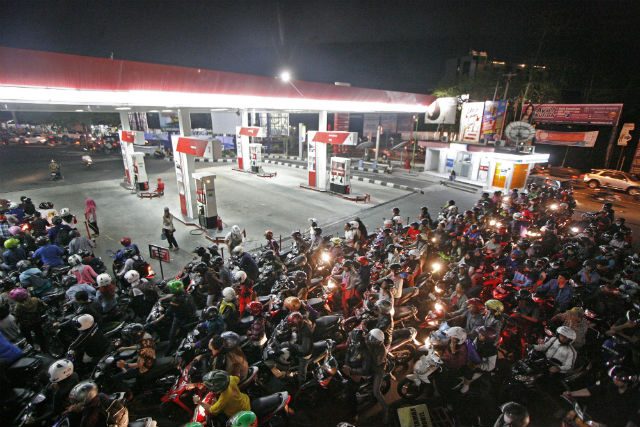SUMMARY
This is AI generated summarization, which may have errors. For context, always refer to the full article.
![]() Discounts for fuel in Indonesia have been hurting Southeast Asia’s largest economy. Set to inherit an account deficit when he takes office in late October, newly elected president Joko “Jokowi” Widodo has pushed his predecessor to start rising petrol prices now.
Discounts for fuel in Indonesia have been hurting Southeast Asia’s largest economy. Set to inherit an account deficit when he takes office in late October, newly elected president Joko “Jokowi” Widodo has pushed his predecessor to start rising petrol prices now.
But outgoing President Susilo Bambang Yudhoyono, who raised fuel prices last year by 33%, has refused Widodo’s request – with good reason. Now is not the time to cut subsidies.
Sudden fuel price hikes that come from improperly planned subsidy cuts can rock the country’s political stability and hurt the economy, which has become dependent on the government’s highly generous petrol subsidies.
Joko Widodo has said he would phase out the subsidies in 4 years. He should time them wisely. The government must choose the most comfortable times for the public to ease inflation shocks. They should also prime the public before cutting them off from cheap fuel to avoid violent protests.

Unsustainable and misplaced
To be clear, fuel subsidies should be scrapped. They distort prices. They are unsustainable and misplaced. Thanks to government subsidies which buffer the cost of production and global crude oil prices, petrol in Indonesia is among the cheapest in the world, at IDR6,500 (or around $54 cents) per liter. In comparison, non-subsidized petrol costs IDR12,000 per liter. Indonesia spends 20% of its budget, or around $19 billion per year to keep fuel prices at this rate. In comparison, the government allocates around $39 billion for education, health and housing combined.
Indonesia has subsidized its fuel consumption since 1967, when it was a big oil producer. In 2004, it became a net oil importer, with a big appetite for petrol. Increasing purchasing power has brought more motorists in Indonesia’s urban areas whose fuel bills are partly paid by the government.
The expensive oil imports have caused an account deficit for the last 2.5 years. Indonesia’s current account deficit will be around 3.2% of GDP by year-end.
The subsidy is intended to help Indonesia’s poor. But those benefiting most are the rich in urban areas. They consume 84% of subsidized petrol.
The fuel discounts also limit the government’s ability to attract foreign investments and spur trade activities. Doing business in Indonesia is costly. The country does not have adequate roads, ports and bridges to transport goods across the vast archipelago. The government should spend at least 30% of its budget to improve its infrastructure and reduce logistic costs for businesses. Currently, infrastructure gets 11% of the budget.
Timing and priming the public
Reforming the subsidies system will bring a positive effect for the economy in the long run. But in the short term it would put a strain in consumers — rich or poor — and businesses.
Cost of production will increase. Jobs will be cut. Prices will skyrocket, lowering people’s purchasing power. Discontent will quickly simmer among the public. Suharto lost his 32-year rule in Indonesia after IMF-mandated rises.
Therefore, to ensure subsidy reform success, Widodo should consider two things before raising fuel prices: the time of the year with the lowest inflation rates and public readiness.
The best times to cut subsidies are October-November or March-April. October is the start of Indonesia’s harvest season. High supply of basic commodities lower prices and inflation rates. March is also harvest season and the start of the government fiscal year.
Widodo should reduce the subsidy during these periods to help ease the inflation stress on consumers and manage expected inflation pressures. Rather than rush in a subsidy cut in the next few weeks, Widodo would be better off waiting until March, giving Indonesians time to plan their future consumption based on expected inflation and minimising a drop in consumer spending.
For a strategic decision with large social and economic consequences, the government should not rush. They should carry out public campaigns on the importance of subsidy cuts. Policy makers should properly inform the public on what is realistic to manage their expectations.
When people’s perception on how much their money is worth is aligned with the government’s, it would be easier for Indonesians to tolerate the pain from rising fuel prices.
![]()
Fithra Faisal is an economist currently working as the research and community engagement manager with the Economics Faculty of the University of Indonesia. He does not work for, consult to, own shares in or receive funding from any company or organisation that would benefit from this article, and has no relevant affiliations.
This article was originally published on The Conversation. Read the original article.
Add a comment
How does this make you feel?
There are no comments yet. Add your comment to start the conversation.